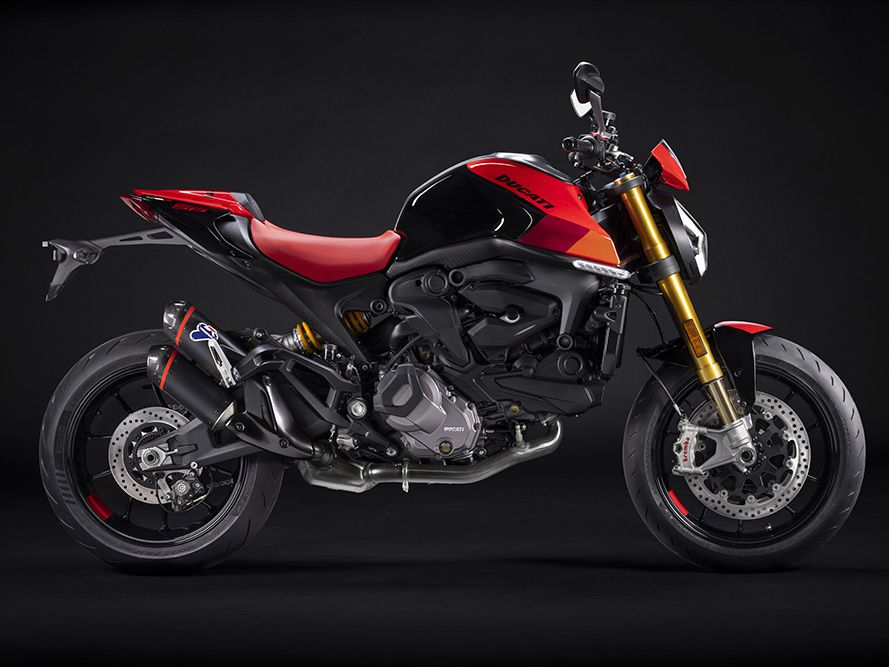
Ups
- The least expensive model in the Ducati lineup (excluding Scrambler models) is also the best value
- Proven electronic rider aids package
- It’s the Universal Italian Motorcycle—approachable, fast, high-tech, and stylish
Downs
- The least expensive Ducati is still pretty pricey compared to the competition
- The Monster’s new style doesn’t make it an instant icon like the original
- Some Ducatisti may mourn the loss of signature elements, like the single-sided swingarm and trellis frame
Verdict
The Ducati Monster is an icon of Italian motorcycling style. The newest incarnation is a stylistic departure from the original, but by using Borgo Panigale’s latest chassis designs, it’s philosophically truer to the original than it’s been for years. With much of the same tech, less weight, a nice dose of go-fast eagerness, and a cheaper price tag than its stablemates, it’s arguably the best value in the Ducati lineup.
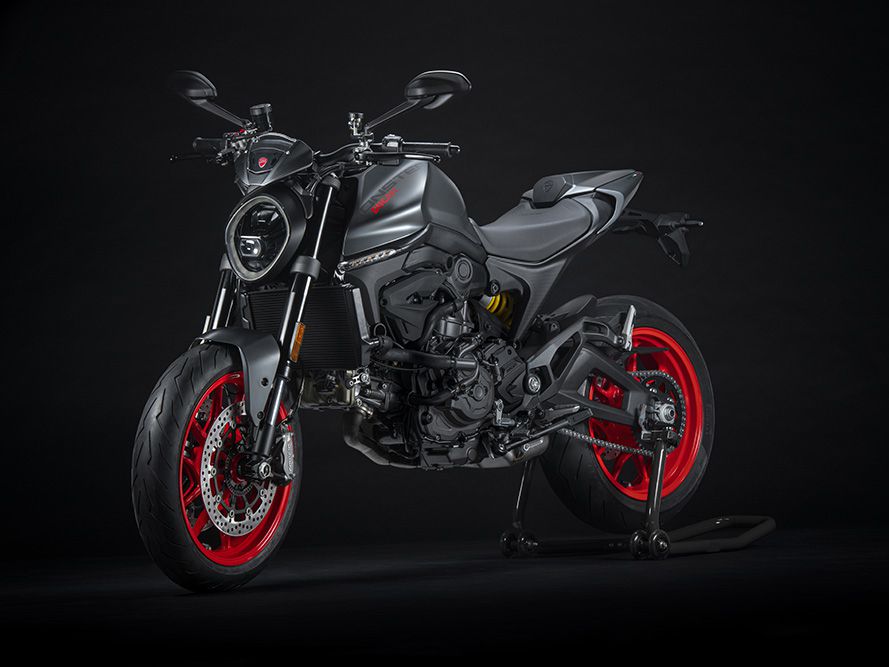
Overview
Miguel Galluzzi’s original Ducati Monster was as significant to Ducati’s future trajectory as its championship-winning superbikes. In close to 30 years, Ducati has sold more than 350,000 Monsters. While continually evolving over time, there’s never been a change as dramatic as the 2021 model refresh; in Borgo Panigale, as the superbike goes, so goes the rest of the lineup. As such, gone are the Monster’s phenotypic traits, like the trellis frame and single-sided swingarm. Some may see the technical changes as iconoclasm, but the Monster is a lighter, faster, and more modern motorcycle because of them.
For decades, the Monster lineup comprised motorcycles of various displacements and trim levels to suit rider experience and budgets. Until the addition of 2023′s SP variant, the new Monster had to be a one-size-fits-all Monster for the masses—and it pretty much was. Usurping the 821 and 1200 models in one fell swoop, the Monster uses the workhorse 937cc Testastretta 11° engine found in the SuperSport, Hypermotard, Multistrada V2, and DesertX. The engine map is tuned to be friendly and accessible, and the 366-pound claimed dry weight is matched with a 32.3-inch seat height and narrow waist to make the Monster approachable for a wide range of riders.
With up-to-date electronic rider aids, intuitive handling, a reasonable price tag, and the best power-to-weight ratio of all the 937cc Testastretta 11°–powered motorcycles, the Monster is more than just an entryway into Ducati ownership. No wonder it was Ducati’s second-highest seller globally in 2022.
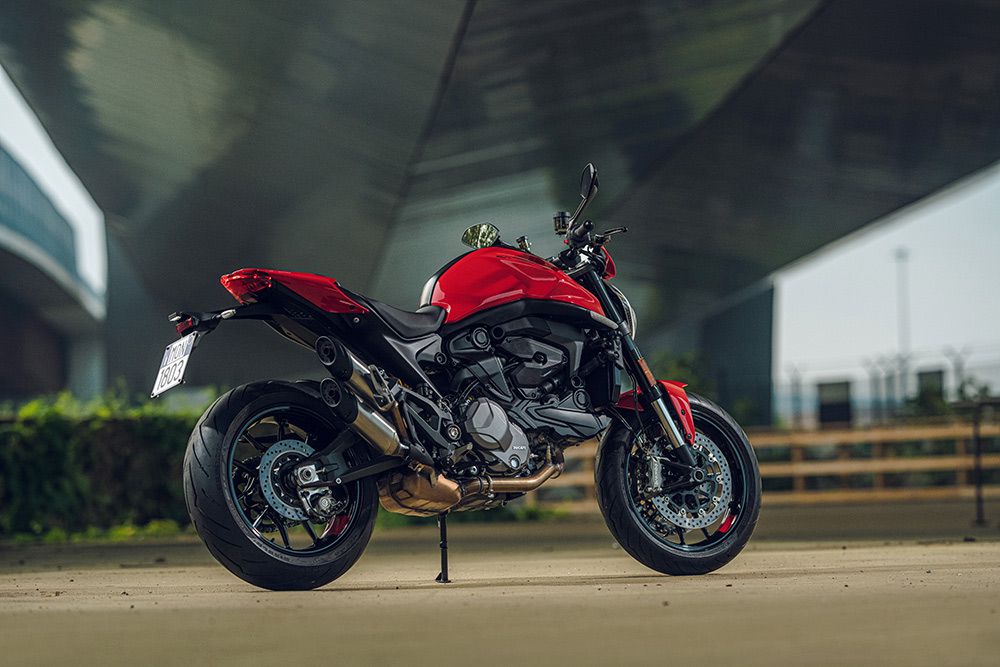
Updates for 2023
For 2023, the Monster pLUS becomes the base model for the US market, and includes a fly screen and seat cowl. The big news is the addition of the Monster SP to the lineup.
Pricing and Variants
The Monster Plus starts at $12,995 for Ducati Red. It’s also available in Aviator Grey and Dark Stealth for $13,195.
The new-for-’23 Monster SP ($15,595) ups the ante with a number of performance-oriented changes. To improve handling, the SP gets an Öhlins NIX 30 fork and Öhlins rear shock. It also comes with a steering damper, homologated Termignoni silencer, a lightweight lithium-ion battery, and reworked electronic settings. It also gets top-shelf Brembo Stylema calipers. Just in case passersby were to overlook the gold anodized fork or chunky calipers, the SP announces its presence with a bespoke “SP” livery reminiscent of the world championship-winning factory GP22 racebike.
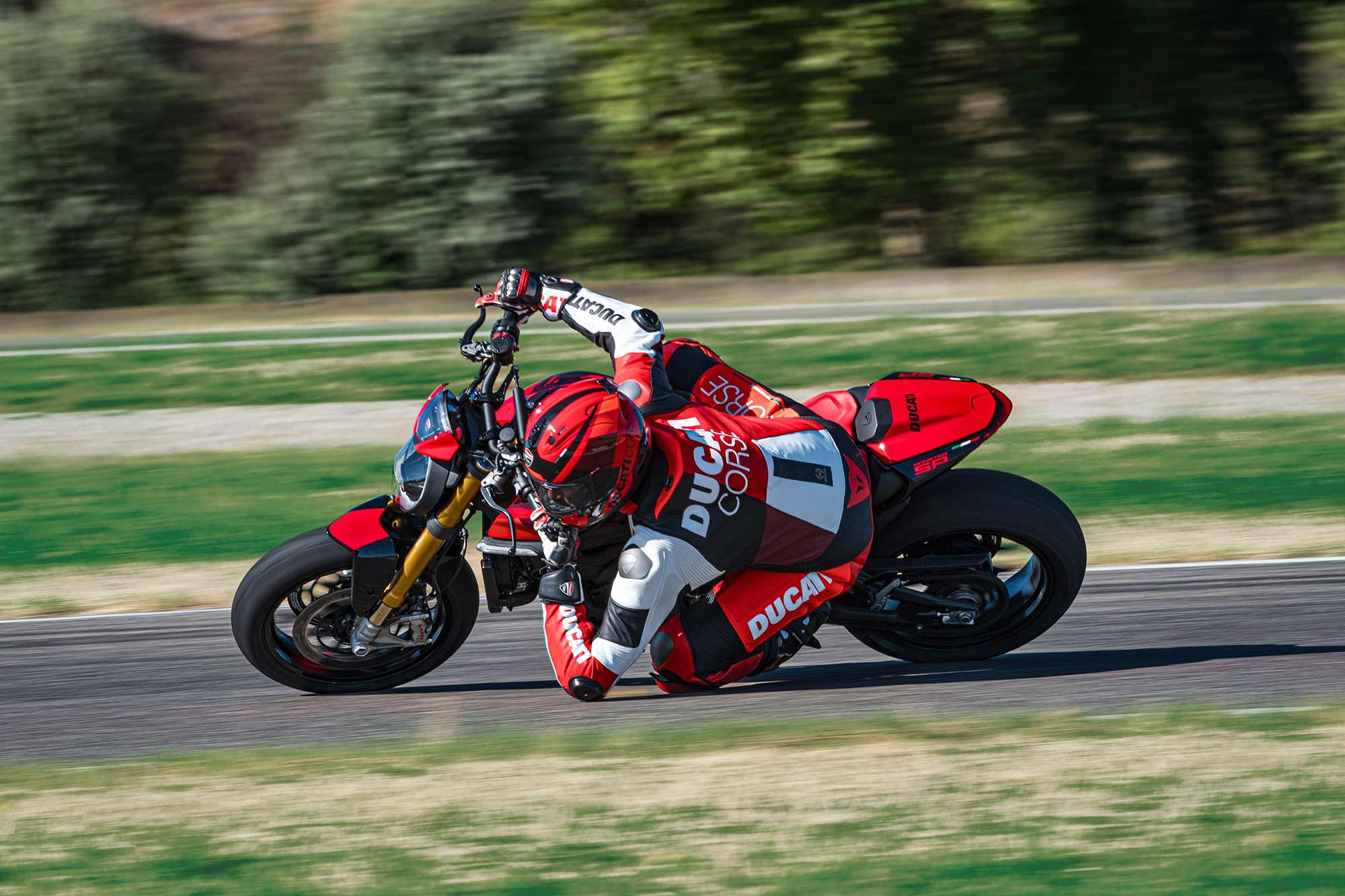
Competition
The Monster may be a good value in Borgo Panigale-land, but compared to the competition, it’s no bargain. As a sign of the health of the category, most OEMs offer base and up-spec models, comparable to the Monster Plus and Monster SP. From Europe, there’s the KTM 790 Duke ($9,199) and 890 Duke R ($12,949), the Triumph Street Triple R ($9,995) and Street Triple RS ($12,595), and various trim levels of the BMW F 900 R (starting at $8,995).
From Japan, the options include the Kawasaki Z900 ($9,399) and Z900 SE ($10,899), the Yamaha MT-09 ($9,799) and MT-09 SP ($11,499), and maybe even the Honda CB1000R Black Edition ($12,999).
Each model is representative of its brand’s values: from the “Ready to Race” Duke to the well-equipped three-cylinder Street Triple and the I-can’t-belive-it-comes-with-Öhlins MT-09 SP. While these models definitely push back on being categorized as standards—some even tread on hyper-naked territory—the Monster seems less caught up with labels, confident in its own middle ground. All these bikes are the Monster’s direct competition, but not entirely naturally, it must be said. Next to the aggressive visages of some of them, the Monster’s not-quite-round headlight looks downright classic. Perhaps that’s telling. Regardless, the Monster is the only V-twin on the list and the only one with a tricolore sticker on the tailsection.
Powertrain: Engine, Transmission, and Performance
The Monster’s power delivery is linear, building progressively to a claimed peak output of 111 hp at 9,250 rpm and peak torque of 69 lb.-ft. at 6,500 rpm. Unlike the Hypermotard, which is indeed hyper, the Monster is civilized and approachable. It’s just as willing to be ridden around town as it is poised to be flogged down a mountain road.
The Monster comes standard with an IMU-managed up/down quickshifter. The six-speed box is a bit notorious for getting false neutrals between sixth and fifth, but Ducati refined the transmission to alleviate the problem.
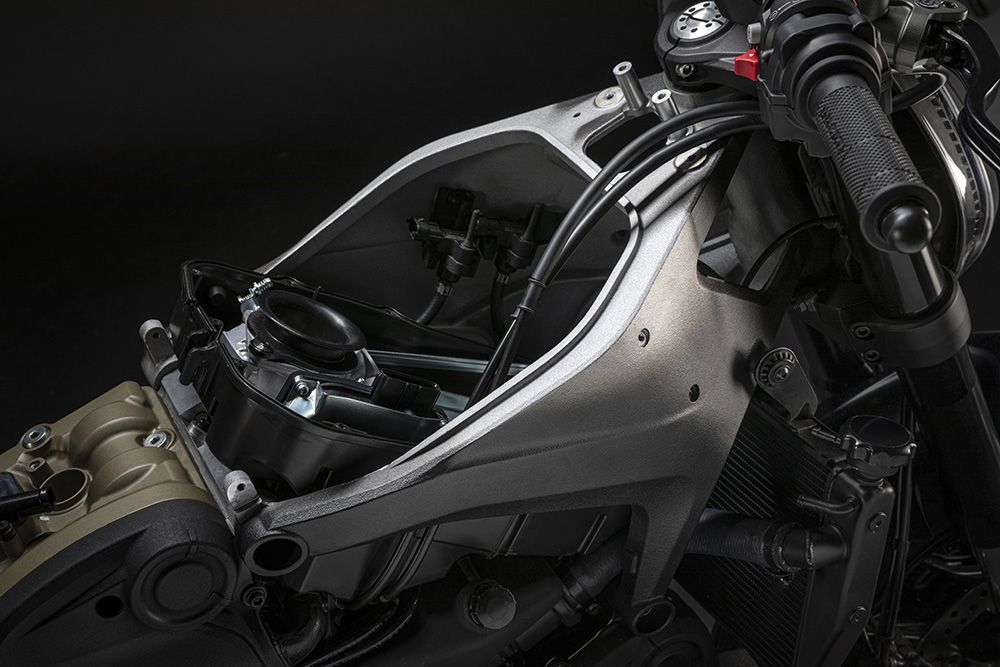
Chassis/Handling
For 2021, Ducati gave the Monster a Panigale-style aluminum monocoque frame that saves 10 pounds. The rear subframe is made of glass fiber reinforced polymer, which saves an additional 4.2 pounds. In all, the Monster is 40 pounds lighter than its 821 predecessor. The result is agile handling that makes side-to-side transitions a breeze, and around-town maneuvering effortless.
The base model has nonadjustable KYB suspension (except for preload in the rear), but performance is adequate for the average rider.
SP models use a fully adjustable Öhlins NIX30 fork that’s 1.3 pounds lighter than the fork on the Monster Plus, and have a fully adjustable Öhlins shock out back. Higher-spec Pirelli Diablo Rosso IV tires are used, and the steering geometry is slightly more aggressive.
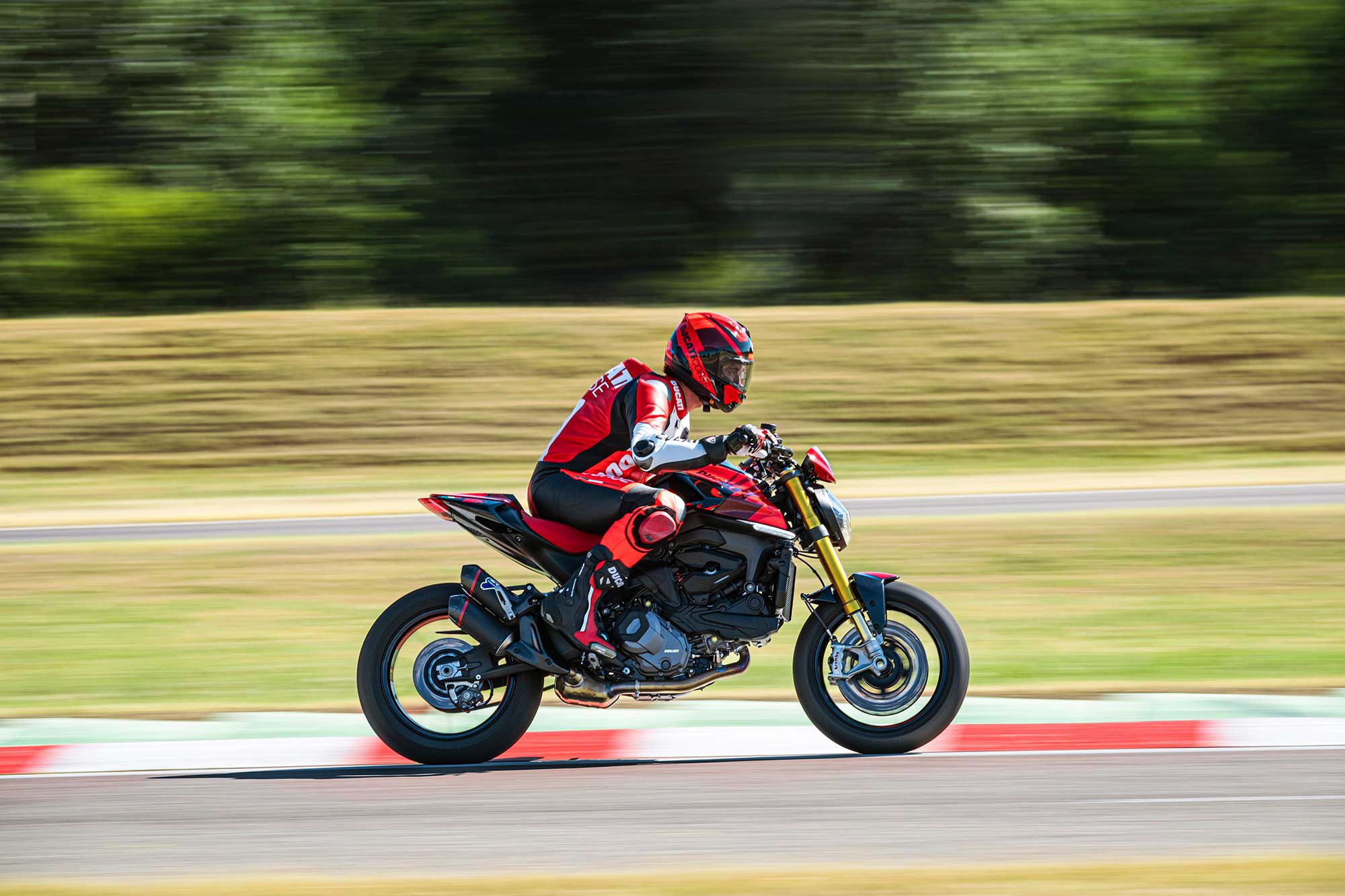
Brakes
The base-model Monster uses 320mm discs up front with Brembo M4.32 radial-mount calipers, and a radial-mount master cylinder. It’s a tried-and-true braking package that offers good feel and power. Harder braking forces squeezed from higher-performing components would quickly overwhelm the suspension. For demons on the brakes, the SP model’s Brembo Stylema and Öhlins suspension are very appealing.
Fuel Economy and Real-World MPG
There are currently no fuel mileage numbers available for the Monster.
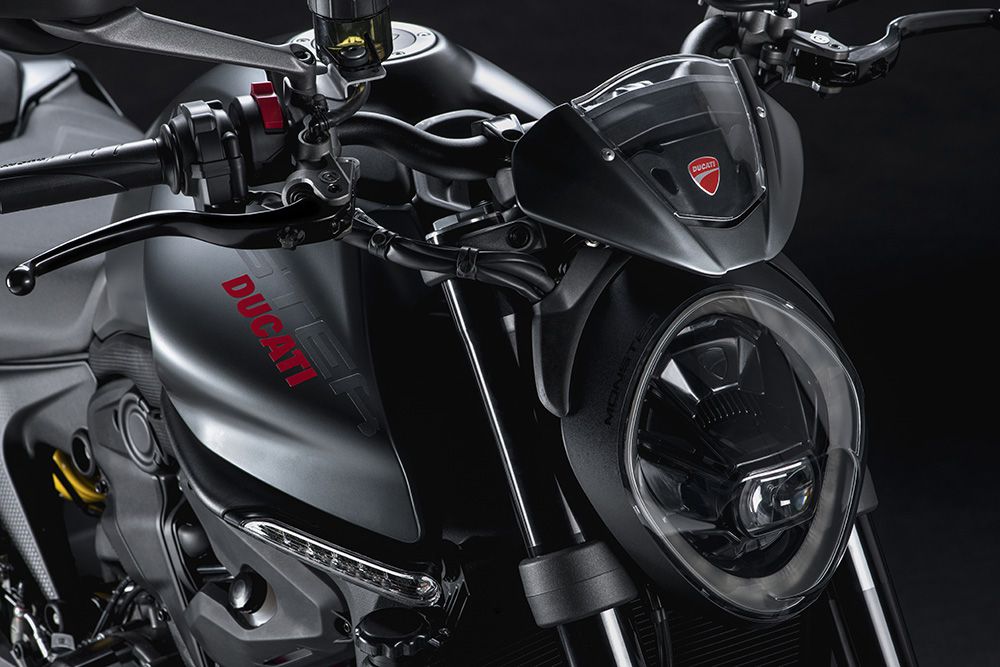
Ergonomics: Comfort and Utility
Compared to its predecessor, the Monster’s handlebar is 2.6 inches closer to the rider, and the footpegs are 1.4 inches farther back and 0.5 inch lower. The seat is comfortable for all-day blasts but the slope at the tank can lock the rider in place. The bike feels very compact yet the rider triangle is generous and accommodates riders of various body types.
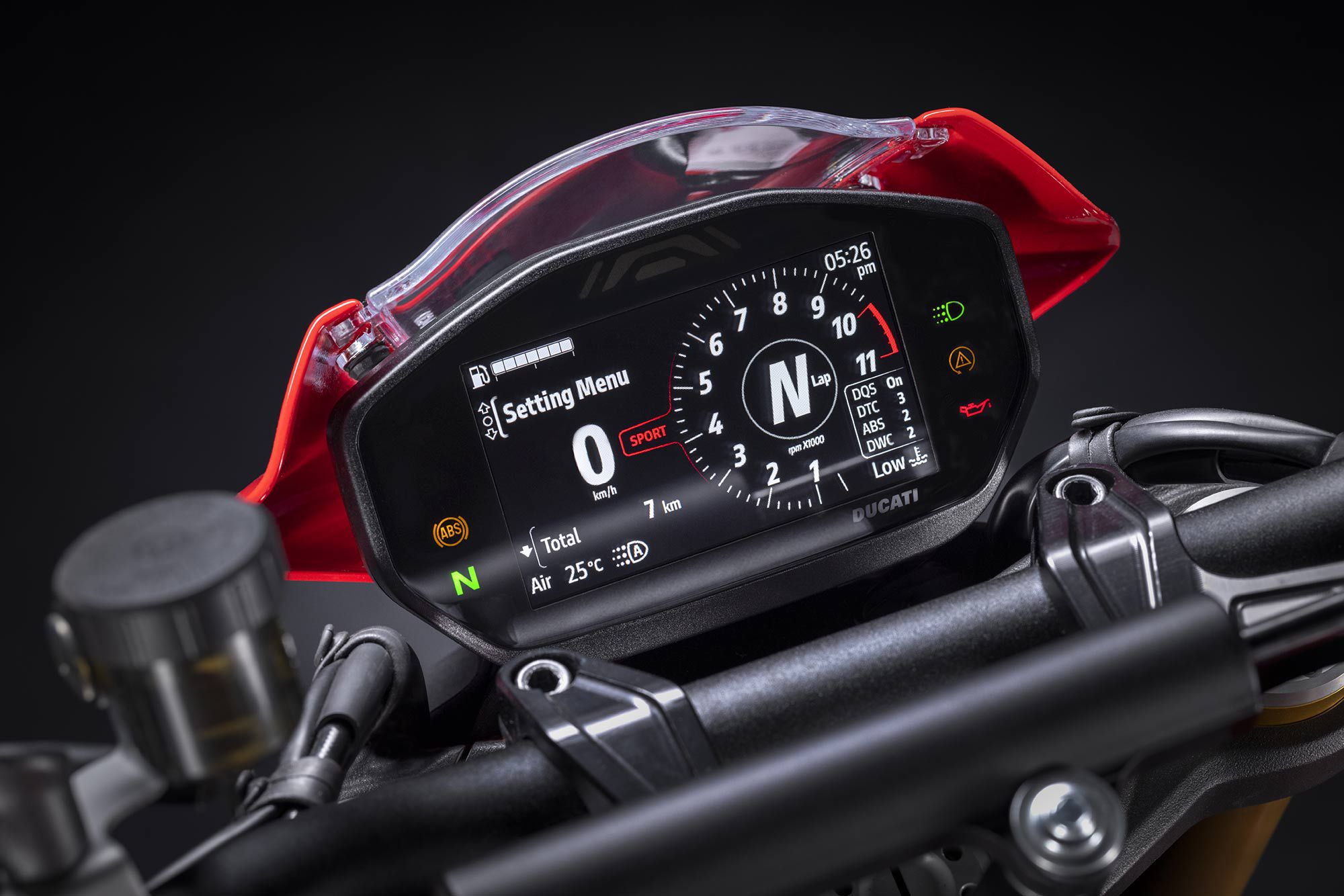
Electronics
The Monster’s electronic rider aids include cornering ABS, traction control, wheelie control, and launch control, all of which are preset in each of the three ride modes (Sport, Touring, Urban). Ride mode settings are customizable. The Monster’s 4.3-inch TFT dash and left-hand switch gear make navigating the menus intuitive. LED lighting accentuates the bike’s modern styling.
Warranty and Maintenance Coverage
Ducati offers a 24-month factory warranty.
Quality
The Monster uses Ducati’s typical premium switchgear and components.
Claimed Specs
| 2023 Ducati Monster Plus | 2023 Ducati Monster SP | |
|---|---|---|
| MSRP: | $12,995 | $15,595 |
| Engine: | 937cc, DOHC, liquid-cooled V-twin; 8 valves | 937cc, DOHC, liquid-cooled V-twin; 8 valves |
| Bore x Stroke: | 94.0 x 67.5mm | 94.0 x 67.5mm |
| Transmission/Final Drive: | 6-speed/chain | 6-speed/chain |
| Fuel Delivery: | Electronic fuel injection w/ 53mm throttle bodies | Electronic fuel injection w/ 53mm throttle bodies |
| Clutch: | Wet, multiplate slipper and self-servo; hydraulic actuation | Wet, multiplate slipper and self-servo; hydraulic actuation |
| Engine Management/Ignition: | Ride-by-wire/TCI | Ride-by-wire/TCI |
| Frame: | Aluminum | Aluminum |
| Front Suspension: | 43mm Kayaba, nonadjustable; 5.1 in. travel | 43mm Öhlins, fully adjustable; 5.5 in. travel |
| Rear Suspension: | Kayaba monoshock, preload adjustable; 5.5 in. travel | Öhlins monoshock, fully adjustable; 5.9 in. travel |
| Front Brake: | Radially mounted Brembo M4.32 4-piston calipers, dual 320mm semi-floating discs w/ Cornering ABS | Radially mounted Brembo Stylema calipers, dual 320mm semi-floating discs w/ Cornering ABS |
| Rear Brake: | Brembo 2-piston floating caliper, 245mm disc w/ Cornering ABS | Brembo 2-piston floating caliper, 245mm disc w/ Cornering ABS |
| Wheels, Front/Rear: | Light alloy cast; 17 x 3.5 in. / 17 x 5.5 in. | Light alloy cast; 17 x 3.5 in. / 17 x 5.5 in. |
| Tires, Front/Rear: | Pirelli Diablo Rosso III; 120/70ZR-17 / 180/55ZR-17 | Pirelli Diablo Rosso IV; 120/70ZR-17 / 180/55ZR-17 |
| Rake/Trail: | 24.0°/3.7 in. | 23.0°/3.4 in. |
| Wheelbase: | 58.0 in. | 57.9 in. |
| Seat Height: | 32.3 in. | 33.1 in. |
| Fuel Capacity: | 3.7 gal. | 3.7 gal. |
| Wet Weight: | 414 lb. | 410 lb. |
| Contact: | ducati.com | ducati.com |
Source: MotorCyclistOnline.com
